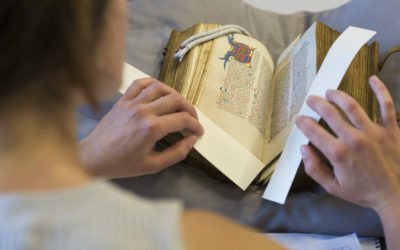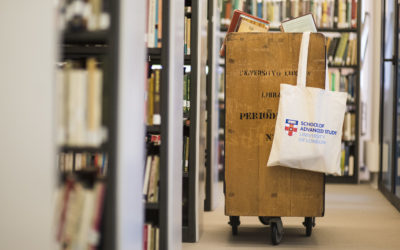The Institute of English Studies
History of the book, manuscript and print studies and textual scholarship research
‘English’ 3
Over the past month or so, I’ve been mulling over Marion Thain’s brilliantly suggestive essay on the nature and future of English as a discipline, which has helped me to notice things that otherwise might have passed me by…
Reading John Edgar Wideman’s ‘Fever’.
In the early morning I run through Beckenham Place Park which is cut in two by the trainline to Victoria. Half-empty carriages click-clack past carrying the remaining few commuters into the city. I have missed reading books in the Victorian manner…
Peer Reviewed: Tony Russ
Looking back on the last four years of research leading up to the submission of my PhD thesis in June and the viva in September, the question that kept recurring was – why am I doing this? PhDs are hard work, and the going gets tough along the way as various seemingly...
Peer Reviewed: ‘Consuming Activism?’, Flore Janssen
My research often explores activist responses to ongoing social problems. During my Visiting Postdoctoral Research Fellowship at the IES I have worked on a monograph on women’s role in consumer activism in the UK and USA between 1885 and 1920. These initiatives, part...
Peer Reviewed: ‘On Research … And Friendship’, Chris Adams
I got my start in English studies in early modern textual editing, but over the last two years have transitioned into postwar (queer) literature. As I’ve explored how queer fiction was published, marketed, and sold in an era that criminalised homosexuality and had a...
Peer Reviewed: ‘Researching from Home’, Flore Janssen
Working from home is a significant theme in my research – though not as we have got to know it in 2020. For much of the nineteenth and twentieth centuries, ‘home work’ generally betokened the exploitative labour practices known as ‘sweating’. Home workers were...
Peer Reviewed: Elizabeth Sandis
The best moments of my Post Doc? Collaborating with brilliant minds by co-authoring pieces or co-teaching courses together. Hardest moments? Probably collaborating! Especially on journal articles; it can be a long, drawn-out process, which requires a lot of...
Peer Reviewed: ‘Big Changes’, Krystle Attard Trevisan
It has been a tough, surreal year for all of us. Covid-19 has changed the way we study, work and communicate. My doctoral research is on an 18th century print collection in Malta. I had planned to catalogue all 4,500 prints in my first year of part-time study, but,...
‘The Matter of English’ 2
Marion Thain’s blog is about “public questions of English cultural identities”: she asks if we, as a discipline (named, after all, for a national identity) “have a particular opportunity to contribute, collectively, distinctive resources and expertise to this debate”?...
English
In the early days of my career, the English ‘English’ department I was working in took as its remit British literature written in English. In other words, the ‘English’ remit was defined neither by language — by the extent of literatures written in English — nor by the geographical boundaries of England. This has been an uncomfortable fudge for many in the discipline…



